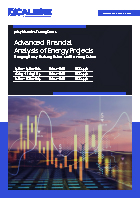| Date | Venue | Fee | |
|---|---|---|---|
| 17 Aug - 21 Aug 2026 | Dubai – UAE | $ 5,950 | Register Now |
| 23 Nov - 27 Nov 2026 | Dubai – UAE | $ 5,950 | Register Now |
About the Course
The landscape for implementing energy-efficient projects is rapidly changing. Legislation, oil prices, and the growing concern for global warming have brought about the factors influencing energy project financing. Investments in the energy sector often combine capital intensity with new technologies, which requires a more profound knowledge of the fundamentals of financial management. The latter includes the three major financial decisions: capital budgeting decision, capital structure decision and working capital management decision. These decisions involve profitability, expenses, cash and credit, budgeting, financial control, planning, information systems, managerial, and strategic planning.
This 5-day Advanced Financial Analysis of Energy Projects training course delivers all the knowledge in financial management to understand the critical areas of accounting in the energy sector, cash management, financial statements, professional analysis of business performance, and the required tools to reduce the energy consumption of a process or utility. It will help the delegates understand the best practices in energy project finance, capital budgeting, financial structure costing, investment appraisal, and energy project valuation; in addition to these derivatives, it develops their financial management skills. This programme involves working capital management, including the various concepts and definitions of working capital and the relationship between profitability, liquidity, and risk in light of the basic policies of working capital management.
Core Objectives
The delegates will achieve the following objectives:
- Appreciate the specificities of the accounting standards in the energy projects
- Understand financial reporting requirements for the energy sector under IFRS and GAAP
- Analyse the financial statements of his organisation
- Know the use of financial ratios to analyse the financial situation
- Manage the cash and working capital effectively
- Define fundamentals of cost analysis and capital budgeting
- Determine the cost of capital to evaluate alternative sources of financing
- Understand the techniques of investment appraisal
- Understand the derivatives and types of options in the energy sector
Training Approach
The delegates on this training course will receive thorough training on the subjects utilising various proven adult learning, teaching, and facilitation techniques. It includes interactive techniques to ensure maximum understanding, comprehension, and retention of the information presented. Evaluation of case studies of energy projects using the latest styles, brief presentations, group exercises, and discussion followed by delegates' results presentations.
The Attendees
Everyone who works in the accounting and financial field and any company must possess basic skills in financial analysis and its tools and the ability to interpret numbers, which helps in evaluating the company's financial performance, identifying deficiencies, and working to address them before they escalate and become difficult to solve.
Likewise, it will be valuable to the professionals but not limited to the following:
- Management Accountants
- Board of Directors & Senior Management
- Financial & Accounting Department Managers
- Corporate Accountants, Financial Controllers, and Treasury Officers
- Financial and Investment Analysts
- Joint Venture Accountants and Auditors
- External, Financial, and Internal Auditors
- Government Regulators and Auditors
Daily Discussion
DAY ONE: OVERVIEW OF ENERGY INDUSTRY & TOOLS OF FINANCE
- The Nature of the Energy Projects and Renewable Energies
- Current and Future Challenges of the Energy Sector
- Financing Resource of Energy Projects
- The Tools of Finance
- The KPIs of Energy Projects
DAY TWO: ACCOUNTING ISSUES IN EXPLORATION & EVALUATION OF ENERGY PROJECTS
- International Accounting Standards
- Pre-Exploration Activities
- Successful Efforts Method
- Acquisition Costs
- Exploration Costs: Drilling vs Non-Drilling
- Development and Production Costs
- Full Cost Method
- Revenue Recognition
- IFRS within the Energy sector
DAY THREE: FINANCIAL ANALYSIS OF ENERGY PROJECTS
- Fundamentals of Financial Analysis
- Vertical Financial Analysis
- Horizontal Financial Analysis
- Analysis Using Financial Ratios
- Managing the Working Capital
- Measures of Operating & Financial Performance
- Cost of Capital: Cost of Equity, Cost of Debt and Weighted Average Cost of Capital (WACC)
DAY FOUR: CAPITAL BUDGETING OF ENERGY PROJECTS
- Technical Aspects of Energy Projects
- The Time Value of Money
- Estimating Cash Flows for Capital Budgeting
- Cost of Capital: Cost of Debt
- Capital Budgeting Techniques and Taking the Investment Decision
- Traditional Criteria: Payback Period and Average Rate of Return
- Economic Discounted Cash Flow Criteria: Discounted Payback Period, Net Present Value and d Internal Rate of Return
- The Value-Added Criterion
- Evaluating Projects under Uncertainties
- Sensitivity Analysis
- Break-Even Analysis
DAY FIVE: CAPITAL STRUCTURE OF ENERGY PROJECTS
- Capital Structure Concept
- Capital Expenditures
- Capital Structure and Financial Distress
- Agency Costs in Financial Distress
- Causes of Financial Distress
- Costs of Financial Distress
- Design Aspects for Measures to Attract Private Investment
Certificate Awarded
Upon successful completion of this training course, participants will be awarded a Certificate of Completion from XCalibre Training Centre, acknowledging their accomplishment. This certificate serves as a testament to their dedication to developing their skills and advancing their expertise in their respective fields.



